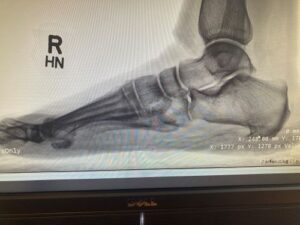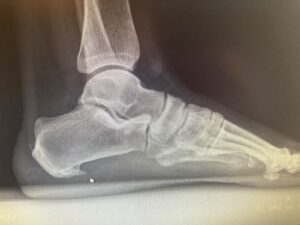Same Day Appointments Available!
Call Us 24/7 (801) 619-2170
Salt Lake City * Sandy * West Jordan

Should I Have My Plantar Heel Spur Removed?
Home » Blog » Should I Have My Plantar Heel Spur Removed?
Plantar heel spurs – bony protrusions under the heel bone – are a fairly common condition. And yet, somehow, they tend to also be underdiagnosed and underreported, on account of most people who have them remaining unaware they do.
At least, that’s the case until they become symptomatic and they start experiencing pain in the heel.
What Are Plantar Heel Spurs?
Plantar heel spurs are small, calcified growths that appear under the calcaneus (heel bone). They are slow to build, usually taking several months of repeated stress and tearing of ligaments and muscles in the foot.
How Do Heel Spurs Form?
When parts of the body receive damage, the body’s natural response is to build tissue to repair the area. This is how calluses form, and the same logic carries over when it comes to plantar heel spurs.
As the ligaments and muscles around the heel sustain damage, the body begins to deposit calcium in the area for added support and strength, forming a spur. These deposits can often go unnoticed until they are large enough to be felt.
Plantar heel spurs have been known to grow up to an inch in size.
People with plantar fasciitis are at an increased risk of developing plantar heel spurs, as are those with lowered arches of the feet (flat feet).
Plantar Fasciitis and Plantar Heel Spurs
Plantar fasciitis is characterized by pain in the plantar fascia – a band of tissue that runs over the heel bone and stretches toward the toes. It often occurs as a result of damage and, as a result, concurrently with plantar heel spurs.
Popular belief is that spurs cause plantar fasciitis, and while this is sometimes the case, most of the time, inflammation, rather than the spur itself, is the culprit behind the pain.
Managing Plantar Fasciitis and Heel Pain
Mild cases of plantar fasciitis, as well as some moderate ones, can be treated from home. Here are some DIY remedies to treat heel pain.
Rest and Ice
Rest your feet after strenuous activity, and treat painful areas with ice or cold compresses to reduce any inflammation your heel may be experiencing.
Arch Supports
Good supports for the arches of the feet can help relieve pressure from the plantar fascia. Custom orthotic inserts accomplish this by forming a perfect fit between the foot and the sole of the shoe, evenly distributing the weight the foot supports.
Stretching Exercises
Calf exercises and activities that strengthen the Achilles tendon can strengthen the plantar fascia and improve flexibility in the area. This, in turn, allows the feet to go longer distances before experiencing pain.
Non-Steroidal Anti-Inflammatory Drugs (NSAIDs)
OTC medications such as ibuprofen are generally a safe means to reduce inflammation in the plantar fascia. However, as with all drugs, stay informed of any contraindications, such as use in patients with ulcers, heart conditions, or sensitivity to NSAIDs.
Medical Treatment For Plantar Fasciitis
If home remedies don’t cut it, a skilled podiatrist may address plantar fasciitis with the following treatments.
Cortisone Injections
If pain persists after milder remedies have been exhausted, your podiatrist may recommend a cortisone injection. This hormone-based treatment reduces swelling pain by limiting the body’s immune response.
Plantar Spur Removal
If even cortisone injections fail to provide relief, then the spur itself might be the cause of pain. In this case, a podiatrist will know that the spur is applying pressure on either the lateral plantar nerve or the inferior calcaneal nerve.
Removal of the plantar spur will relieve pain, but patients will have to wear a cam boot for six weeks because the removal of the spur can weaken that part of the heel bone until it is fully healed.
In the x-rays posted, the patients had no history of heel pain, and the finding was incidental.
Contact a Salt Lake City Podiatrist For Plantar Heel Spur Treatment Today
If you are experiencing pain in your feet and suspect a plantar spur, call Salt Lake City Podiatrist Dr. Elizabeth Auger, DPM. With nearly two and a half decades of podiatry experience, Dr. Auger has built a reputation for effective, holistic healing and personalized treatment for her patients.
Dr. Auger offers same-day appointments and offers her services across three locations, all of which you can reach online or by calling 801-619-2170.
Foot and Ankle
Conditions
- Allergic Contact Dermititis
- Achilles Tendonitis
- Athlete’s Foot
- Brachymetatarsia
- Bunions
- Calluses
- Diabetes
- Flatfoot (Fallen Arches)
- Foot Ulcerations (Diabetic Ulcers/Wounds)
- Salt Lake City Fungal Nail
- Ganglions
- Gout
- Haglund’s Deformity
- Hallux Rigidus
- Hammertoes
- Heel Pain (Fasciitis)
- Foot Infections
- Ingrown Toenails
- Injuries
- Metatarsalgia
- Morton’s Neuroma
- Osteoarthritis
- Paronychia
- Plantar Fasciitis
- Plantar Warts
- Posterior Tibial Dysfunction
- Rheumatoid Arthritis
- Running Injuries
- Sesamoiditis
- Skin Conditions
- Sprains & Strains
- Tailor’s Bunion
- Tarsal Tunnel Syndrome
- Tendonitis
- Toe Deformities
- Xerosis
1561 W 7000 S, Suite 200
West Jordan, Utah 84084
(801) 509-9959
3934 S 2300 E
Salt Lake City, UT 84124
(801) 396-9743


